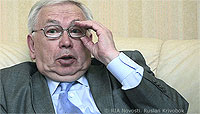Russian rights ombudsman sets hopes on changes to controversial NGO law

(Interfax – July 9, 2013) Russia’s human rights ombudsman, Vladimir Lukin, has said he hopes the controversy over Russia’s “foreign agent” NGO law will subside if the legislation is amended to clearly distinguish between organizations engaged in political activity and those working on social issues, Russian privately-owned Interfax news agency reported on 9 July.(1)
“Everything depends on which amendments are passed,” he was quoted as telling Interfax, “but I think the movement is in the right direction. I too am not a supporter of human rights organizations engaging in active political activity.”
“If by active political activity is understood taking part in elections, the political struggle for power, nominating candidates, then this should be the job of political parties,” Lukin said, adding: “If a clear distinction is made, then the human rights aspect of the work of non-governmental organizations, including in areas that touch on politics, will fall outside the concept of ‘political activity.'”
On 4 July President Vladimir Putin met human rights activists and said he had ordered that the law be amended to differentiate between NGOs involved in domestic politics and those that deal with social issues.(2)
On 9 July Russian TV showed Putin meeting Prosecutor-General Yuriy Chayka to further discuss the law. Putin instructed Chayka to “look at instances of when some mistakes may have been committed whereby some organizations were covered by that law on formal grounds but in fact they were not engaged in domestic political activities”. Putin added: “It is necessary to separate purely political, domestic political, activities from humanitarian, in the wide sense of the word, operations.”(3)
For his part, Lukin said he was glad to hear a recent statement from Council of Europe Secretary General Thorbjorn Jagland that he welcomed Putin’s intention to introduce amendments to the law on “foreign agent” NGOs to clarify the term “political activity”.
“I think this is a constructive statement,” Lukin said. “Not long ago the Council of Europe Secretary General met the president of Russia. Following this meeting there has been a constructive tone in relations between our authorities and the Council of Europe. This sets a good tone for further movement in the right direction,” he said.(4)
The law on NGOs, which came into force on 21 November 2012, requires NGOs that receive funding from abroad and engage in political activity to register with the Justice Ministry as “foreign agents”. Advocates of the law say it is necessary to prevent foreign-funded meddling in Russia’s domestic affairs. Its critics, however, see it as an instrument to stigmatize NGOs and crack down on civil society.
(1) Interfax news agency, Moscow, in Russian 1438 gmt 9 Jul 13
(2) Moscow Times website, Moscow, in English 5 Jul 13
(3) Rossiya 24 news channel, Moscow, in Russian 1423 gmt 9 Jul 13
(4) As 1
